25 Superfoods To Add to Your Grocery List
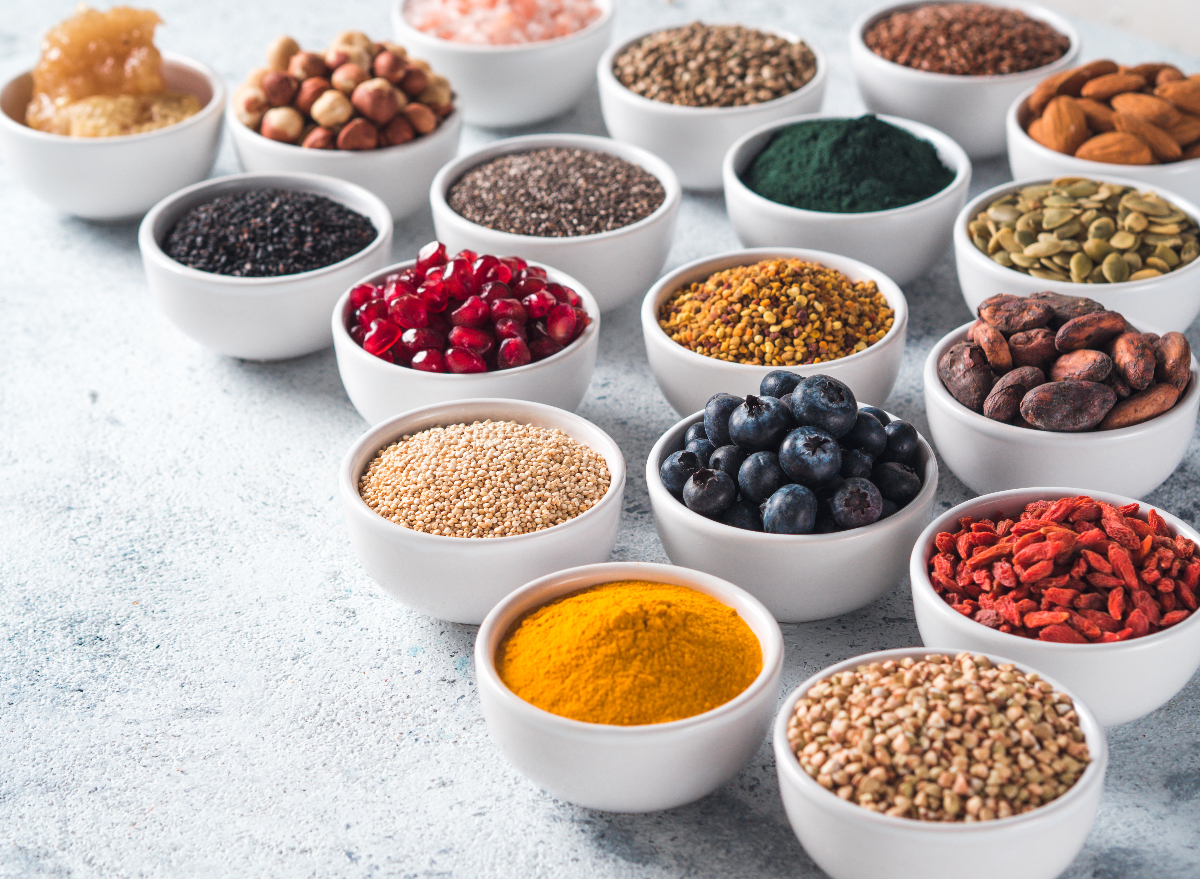
Fueling your body with the right nutrients is essential, but no single food provides all the nutrition you need for optimal health and wellness. That’s why it’s important to include a variety of foods in your diet, as each ingredient brings different nutritional benefits to your plate.
While all foods support your health in their own way, certain superfoods are uniquely poised to provide the greatest health punch. Brimming with vitamins, minerals, antioxidants, and other health-supporting nutrients, these superfoods are backed by significant scientific agreement to improve the nutritional quality of your diet while reducing the risk for specific chronic conditions.
By incorporating these nutrient-dense foods into your daily meals and snacks, you can fill your plate and fuel your body with the building blocks it needs to thrive. From the heart-healthy omega-3 fatty acids found in salmon to gut-healing probiotics in yogurt, these 25 superfoods promise to be your allies in the journey to a healthier, happier you in 2024.
Blueberries
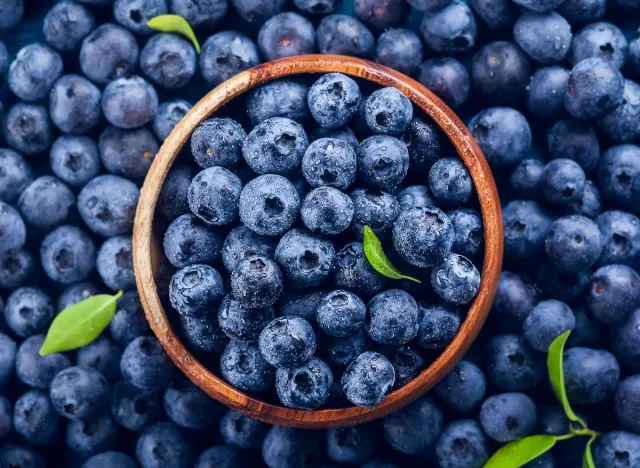
Blueberries have held “superfood” status for years since they have among the highest antioxidant levels of any food. There are more than 1,600 studies evaluating the myriad health benefits of these blue-hued berries. Blueberries are rich in anthocyanins, a unique family of phytonutrients that give blueberries their color. Anthocyanins can help lower blood pressure, reduce the risk of heart disease and type 2 diabetes, help regulate blood sugar, maintain eye health, and offer neuroprotection as you age, according to research published in Advances in Nutrition.
Herbs and Spices
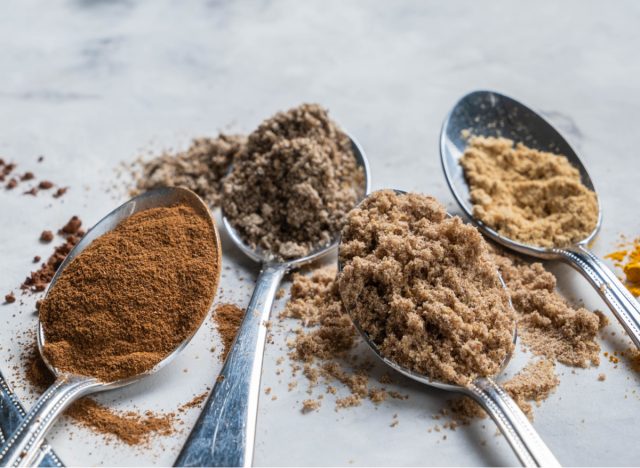
A pinch of an aromatic herb or a dash of a pungent spice are tasty ways to add superfoods to your meals and snacks. Herbs and spices date back to 5,000 B.C., and they have been used for medicinal purposes since ancient times. Some of the known benefits of herbs and spices include antioxidant, antimicrobial, anti-inflammatory, and protection against cardiovascular disease, cognitive declines, and type 2 diabetes, according to research published in Genes & Nutrition.
Lentils
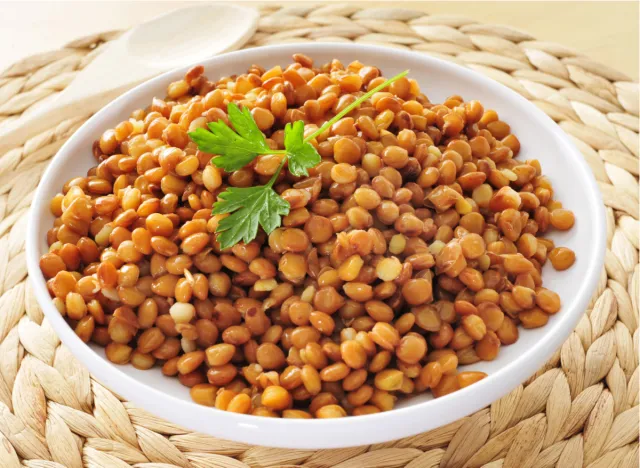
Low in calories and fat but high in protein, fiber, and potassium, lentils have been shown to help reduce blood sugar and cut the risk of developing diabetes. One study found that lentils benefit the blood sugar response not only during the meal in which they’re eaten but also at the subsequent meal enjoyed four hours later. They can also help your ticker. Research indicates that lentils can help reduce LDL (bad) cholesterol, the risk of heart attacks, and inflammation in the arteries. If that’s not enough to make you heart lentils, check out this stat: A national survey found that people who ate lentils four times or more per week had a 22 percent lower risk of coronary heart disease compared to those who consumed them less than once a week.
Dark Chocolate
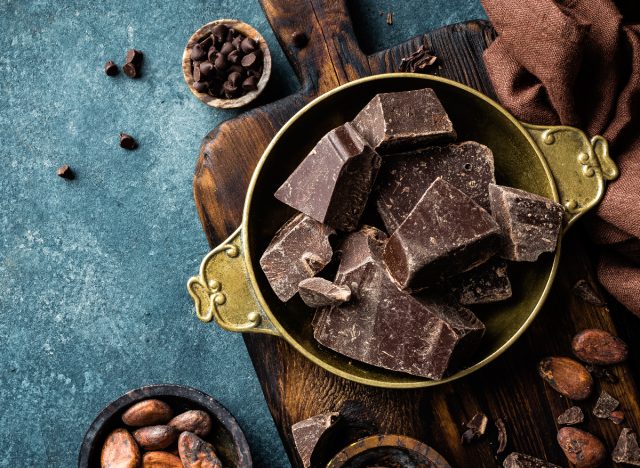
Dark chocolate with 70% or more cacao solids is one of the tastiest and healthiest foods you can enjoy for your health. Cacao is rich in polyphenol flavanols that help boost blood flow and reduce blood clots and blood pressure, which may lower your risk of having a heart attack or stroke. The phenolic compounds also contain anti-cancer properties and reduce the risk for metabolic disorders, according to a review study reported in Food and Chemical Toxicology. Since dark chocolate varies greatly in its flavanols, look for dark chocolate with the highest percentage of cacao. Unsweetened cocoa powder is another way to get the beneficial flavanols in your diet.
Strawberries
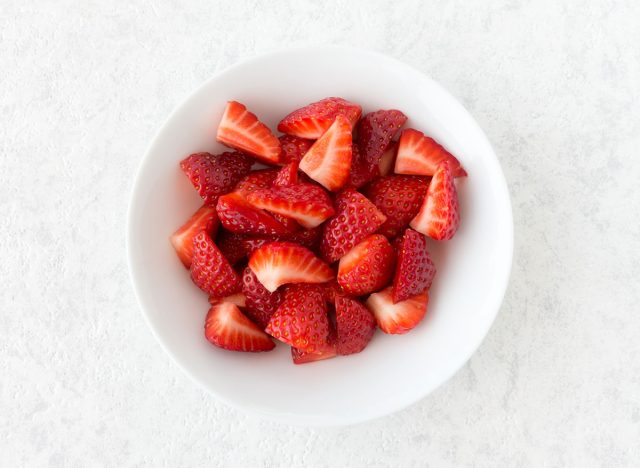
Strawberries are antioxidant-rich and provide fiber, potassium, folate, and flavonoids that are known to help protect against chronic diseases. Plus, these little red gems pack in more vitamin C than an orange — about 160 percent of your daily requirement. And one serving of fresh strawberries (8 berries or 1 cup) contains just 50 calories. Strawberries are a proven heart-healthy food since they’ve been shown to lower the risk of heart attack and stroke, thanks to their ability to lower LDL cholesterol, inflammation, and blood pressure. One study with middle-aged women reported that those who ate at least three servings per week of anthocyanin-rich strawberries (as well as blueberries) reduced their risk of a heart attack by more than 30 percent.
Eggs

Eggs are not only the gold standard by which we compare all high-quality proteins, eggs are nutrient-packed and may help protect against some chronic diseases. An egg has more than 10 essential nutrients, including iron, vitamin D, iron, zinc, and lutein, and provides 6 grams of the highest-quality protein. Few foods naturally contain vitamin D, the sunshine vitamin, which has been shown to help protect against a wide range of conditions including certain cancers, diabetes, and autoimmune diseases. Eating eggs for breakfast may also help you feel fuller for longer and temper blood sugar and cravings to help you eat fewer calories. A report published in the journal Nutrients found that eggs increased muscle protein synthesis and lowered fat mass, which could support optimal body composition.
Greek Yogurt
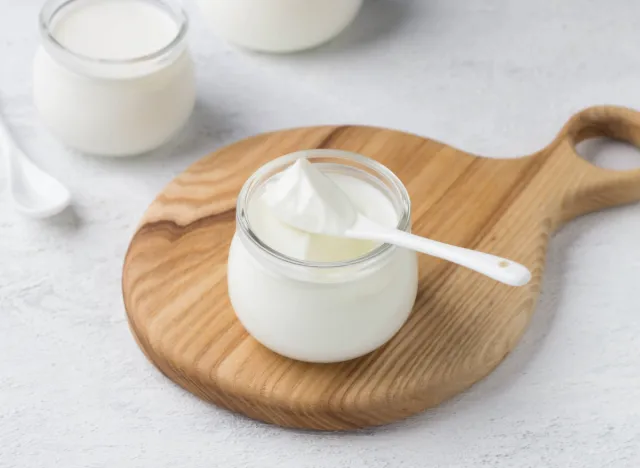
Looking for something that packs in the nutrients you need and helps you peel off pounds? Go Greek! Greek yogurt has the same bone-building calcium—nearly a third of your daily quota—but offers about twice the protein of traditional yogurt and it contains far less sugar. What’s more, studies show that yogurt may help promote weight loss and maintenance due to its protein, probiotics, and essential nutrients. One study, published in the International Journal of Obesity, reported that those who ate more than three servings of yogurt a week were less likely to gain weight and had smaller waistlines, compared to those who ate less than a serving of yogurt per week.
Beans
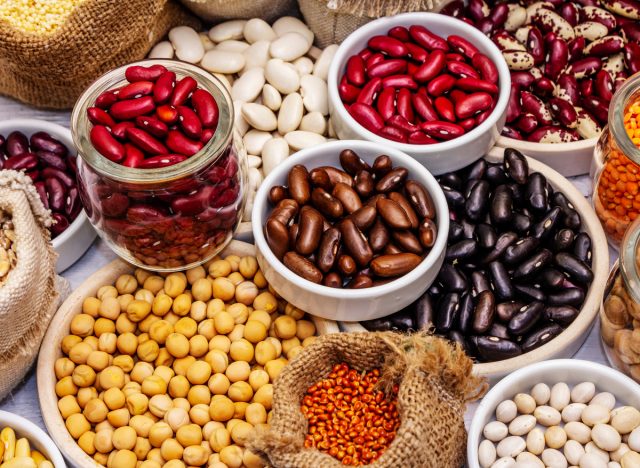
Beans are among the best sources of fiber and slow-to-digest protein. A study in the Journal of Human Nutrition and Dietetics, found that overweight people who ate a bean-rich diet lost nearly 10 pounds in 16 weeks while also improving their blood cholesterol levels. Beans may also help protect against breast cancer. One population-based article published in Cancer Medicine reported that pre-menopausal and postmenopausal women who had the highest intake of beans and fiber from beans experienced a 25-36% reduction in risk for breast cancer compared to those who had the lowest bean consumption. In this study, no associations were found for fiber from grains or fiber from vegetables and fruits combined, or for intake of total produce intake.
Extra Virgin Olive Oil
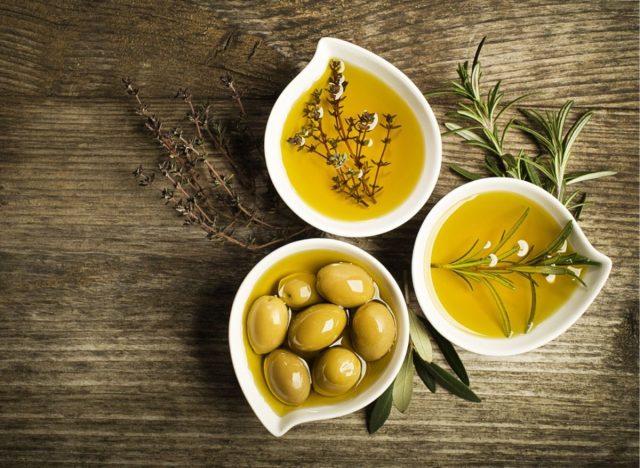
As the primary fat in the traditional Mediterranean Diet, olive oil is rich in a healthy monounsaturated fat that contains many other bioactive compounds. Using olive oil as your primary source of fat when cooking and in dressings can help lower your overall saturated fat intake to help improve biomarkers for health. Research shows that extra virgin olive oil is rich in polyphenols. Studies researching polyphenols show that they help protect against cardiovascular and neurodegenerative diseases as well as cancer. The biological activity of polyphenols is strongly related to their antioxidant properties, according to a review article published in the International Journal of Molecular Sciences.
Red Raspberries
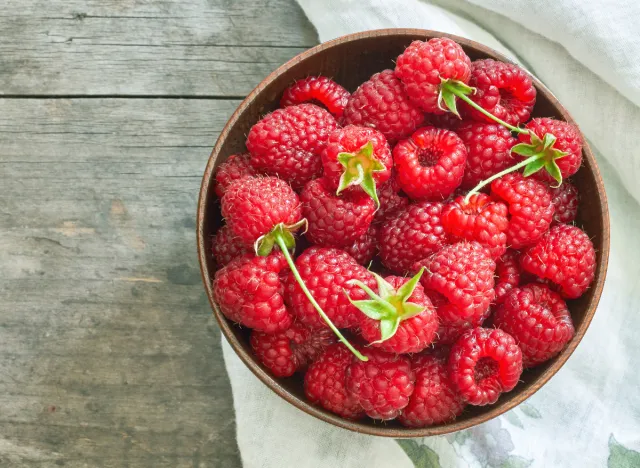
Red raspberries are one of the highest-fiber foods you can enjoy. One cup of the delicious berries packs in 8 grams of fiber. They are also an excellent source of vitamin C, manganese, vitamin K, and they provide vitamin E, magnesium, potassium, and several other nutrients. A review article published in Advances in Nutrition reported that red raspberries can help protect against cardiovascular disease, diabetes, obesity, and Alzheimer’s disease.
Salmon (or other Fatty Fish)

Salmon is one of the best natural sources of omega-3 fats (EPA and DHA), which have been shown to reduce the risk of heart disease, reduce inflammation, improve blood vessel function, and lower the risk of cardiovascular diseases. Additionally, the high-quality protein content in salmon promotes muscle and tissue repair, contributing to overall strength and vitality. Rich in vitamins such as B12 and D, as well as minerals like selenium, salmon supports immune function and bone health. According to research published in Food Chemistry, fish has anti-inflammatory, wound healing, neuroprotection, cardioprotection, and liver health.
Arugula
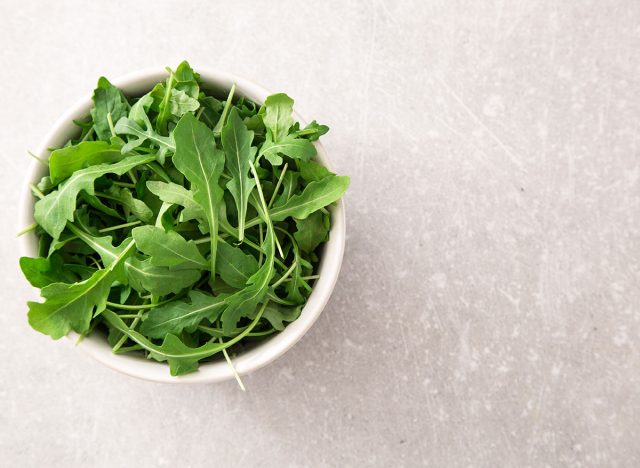
Arugula is a traditional medicinal plant and popular leafy green today. It is mainly consumed raw in Western cuisine and is known to contain various bioactive secondary metabolites. Arugula is known to be rich in erucin, a sulforaphane-like compound that appears to have anti-cancer properties. Research published in PLoS One reported that in laboratory model studies, erucin inhibited the growth of breast cancer cells.
Tomatoes
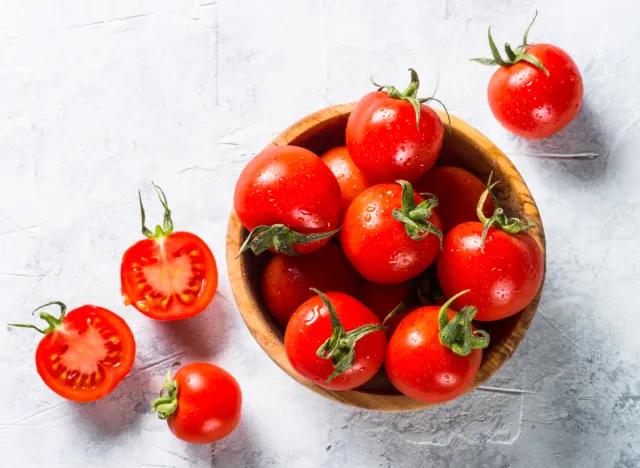
Tomatoes are often considered nutritional all-stars because they’re rich in essential nutrients like vitamin C and folate and they provide rare-to-find lycopene, a carotenoid that acts as an antioxidant and is responsible for the fruit’s ruby-red color. There are more than 1,600 published studies about the health benefits of tomatoes. Several studies have suggested that the lycopene in tomatoes may possess anti-cancer properties and other studies show that tomatoes can help reduce the risk of cardiovascular diseases and disorders and help protect the skin against premature aging from sun damage.
Pistachios
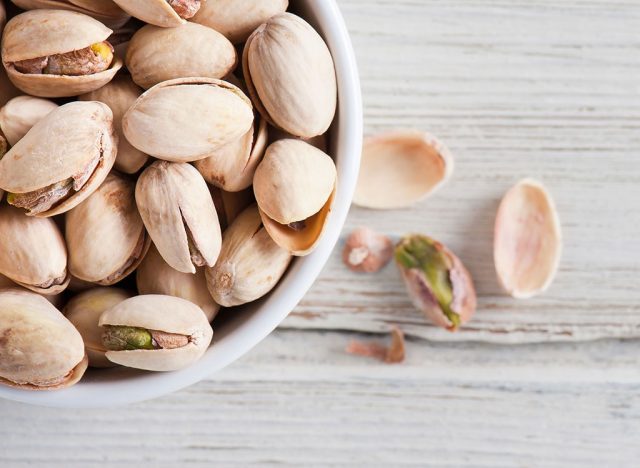
Pistachios are considered one of the healthiest nuts to enjoy. A one-ounce serving—about 49 nuts—delivers a variety of vitamins, minerals, and beneficial nutrients. In fact, the FDA has approved a health claim that says that eating 1.5 ounces per day of most nuts, such as pistachios, as part of a diet low in saturated fat and cholesterol may reduce the risk for heart disease. Pistachios are a good source of both protein and fiber which work together to help keep you feeling fuller longer.
Oranges (and other citrus)

Packed with essential vitamins and minerals, particularly vitamin C, oranges can help maintain a healthy immune system and reduce systemic inflammation that can trigger chronic conditions. A study reported in Frontiers in Immunology reported that citrus is a good source of vitamin C and folate, which both have roles in sustaining the integrity of immunological barriers and in supporting the function of many types of immune cells. Oranges can also help to lower blood pressure and harmful LDL-cholesterol levels.
Tea

As the second most popular beverage after water, tea is among the most researched, with more than 17,000 published research articles about the health and nutritional benefits of tea. Black, green, and oolong tea all come from the same Camellia sinensis plant and all are rich in flavonoids and other bioactive compounds that help reduce the risk for heart disease, certain types of cancer, liver disease, and UV-induced skin aging. In general, research shows that drinking tea may help you live a longer, healthier life. For example, one study reported in Molecular Nutrition & Food Research that looked at more than 40 published studies, the authors concluded that drinking 2-3 cups of tea daily reduced risk of heart disease, stroke, type 2 diabetes, and premature death.
Brussels Sprouts
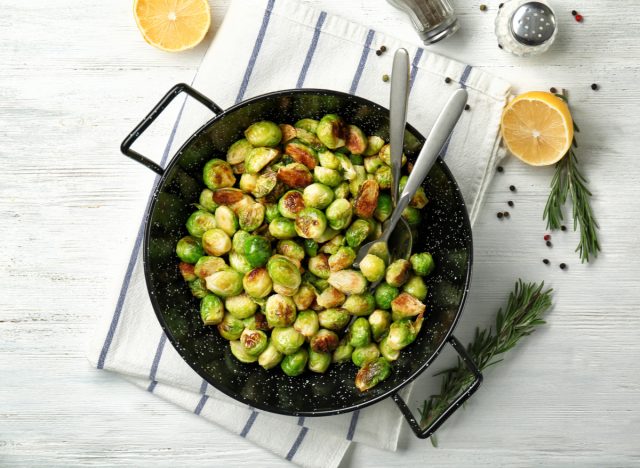
As a cousin to cauliflower (often called mini cauliflower) and broccoli, Brussels sprouts boast impressive nutritionals. They are rich in vitamins C and K, fiber, folate, iron, and potassium and provide beneficial antioxidants. Brussels sprouts contain sulfur-containing compounds that may help protect against several types of cancer, according to research published in Frontiers in Nutrition. What’s more, they are considered heart-healthy, and they provide carotenoids that are important to maintain healthy eyes as you age.
Cauliflower
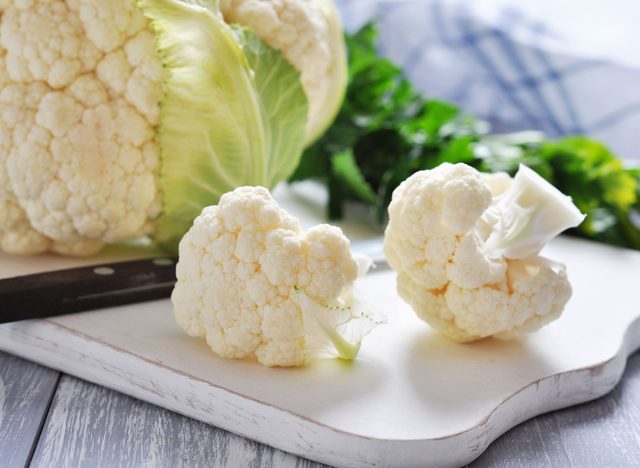
One of the most popular of all of the so-called Brassica family of veggies, cauliflower provides many bioactive compounds and essential nutrients for your health and longevity, according to research. Raw, roasted, “riced,” or mashed, this pungent cruciferous veggie is a versatile staple for anyone looking to level up their diet and reduce the risk for chronic diseases. A serving of cauliflower provides 100% of the vitamin C you need in a day and it’s a good source of folic acid, magnesium, and fiber. And, thanks to the sulforaphane and other bioactive compounds that cruciferous veggies provide, they have been shown to have anti-cancer and heart-health benefits.
Kale
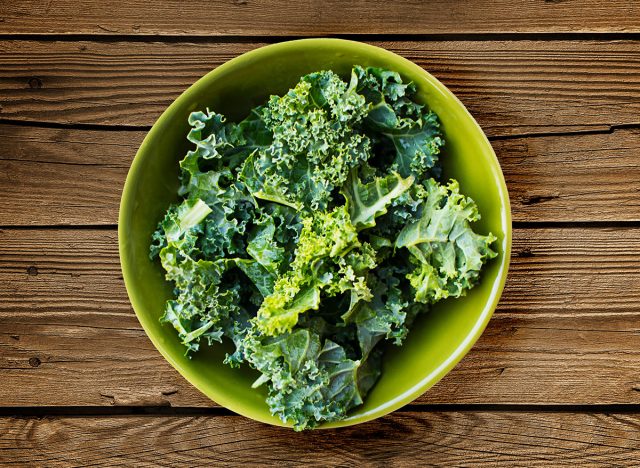
Called the Queen of Greens, kale is a cruciferous veggie that has many of the well-known benefits of these unique veggies. A serving (3 cups fresh) of the Queen of Greens provides 20 calories but it packs a ton of health-promoting nutrients in each serving. Kale is a good source of vitamins A and C, potassium, vitamin K, calcium, folate, fiber, carotenoids, and magnesium. A study reported in the journal Food Science & Technology reported that kale helps protect against coronary artery disease, anti-inflammatory, anti-cancer, and anti-microbial properties. The leafy green is also packed with beneficial antioxidants that may help protect against chronic diseases associated with aging.
Oats
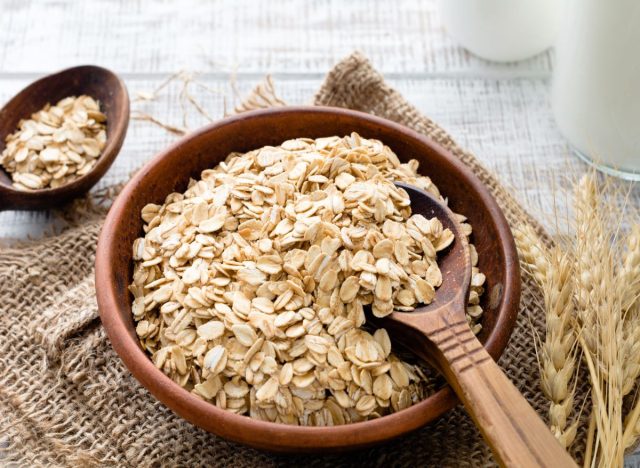
Oats are a 100% whole grain food that are naturally nutrient-rich. They provide a rare type of fiber, beta-glucan, that helps enhance satiety, lower blood sugar, and reduce harmful LDL-cholesterol levels. According to a review study reported in the journal Foods, oats also provide substantial levels of other bioactive compounds including phenolic acids, sterols, and avenanthramides. Oats are also rich in many trace minerals like manganese, copper, iron, and zinc. What’s more, a half-cup serving of oats delivers 5 grams of protein and 4 grams of fiber, which is more than most other grain-based foods. In 1997, the FDA awarded oats the first “food-specific” health claim that says soluble fiber from foods such as oats, as part of a diet low in saturated fat and cholesterol, may reduce the risk of heart disease.
Peanuts and Peanut Butter

Peanuts are a nutrient-rich option providing 19 essential nutrients including protein, fiber, unsaturated fat, magnesium, vitamin B6, vitamin E, and iron. One study published in the Journal of Nutrition reported that individuals who ate the most nuts and peanuts in their diets experienced a 35% reduction in cardiovascular disease, compared to those who ate the least amount of nuts and peanuts. Other studies show that peanuts can help stabilize blood sugar and may help protect against type 2 diabetes.
Seeds (Flaxseeds, Pumpkin Seeds, Chia Seeds, Hemp Seeds, etc)
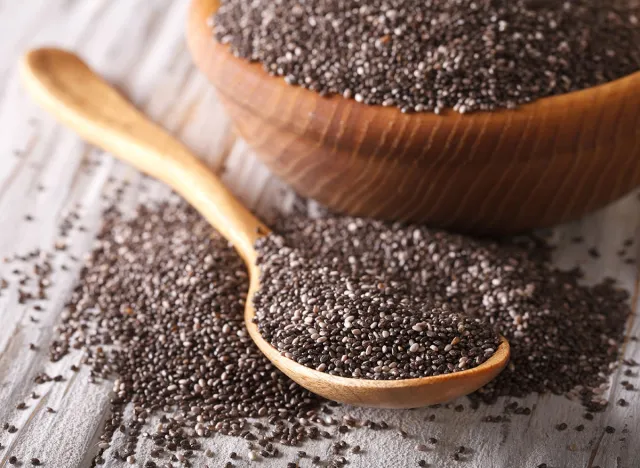
Seeds are superfoods due to the many beneficial nutrients they provide. Seeds are a good source of fiber, magnesium, manganese, potassium, vitamin E, unsaturated fats, and copper. They all provide plant-based protein, and flax and chia seeds contain alpha-linolenic acid, a plant-based omega-3 fatty acid. Seeds, such as chia seeds, contain a variety of antioxidant polyphenols that have heart health, anti-inflammatory, anti-diabetic, anti-obesity, and anti-cancer properties, according to research.
Walnuts
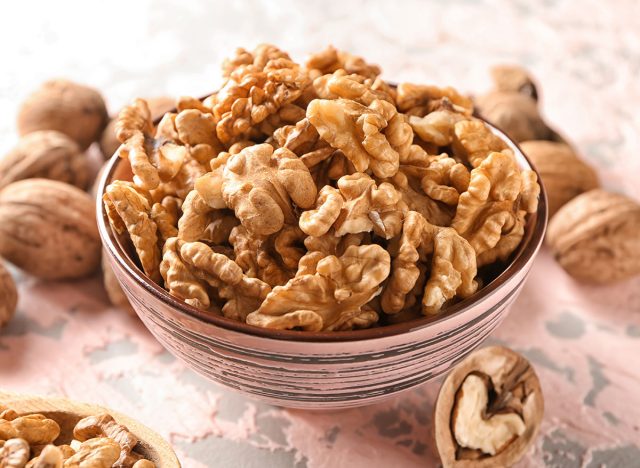
An ounce of walnuts (14 halves) is brimming with nutrients that are essential for optimal health. In addition to essential alpha-linolenic acid (a plant-based omega-3 fat), a serving provides a 1-2 punch of protein and fiber to help increase feelings of fullness. One study reported in the Journal of Nutrition reported that walnuts helped reduce harmful LDL-cholesterol levels and lowered blood pressure. Walnuts are one of the best plant food sources of omega-3s, a one-ounce serving of walnuts provides 2.5 grams of ALA.
A growing body of scientific evidence indicates that these omega-3s provide benefits to the brain and heart while tempering inflammation throughout the body. Another study suggests that walnuts may decrease the risk or progression of other brain disorders such as Parkinson’s disease, stroke, and depression, as well as cardiovascular disease and type 2 diabetes.
Beets
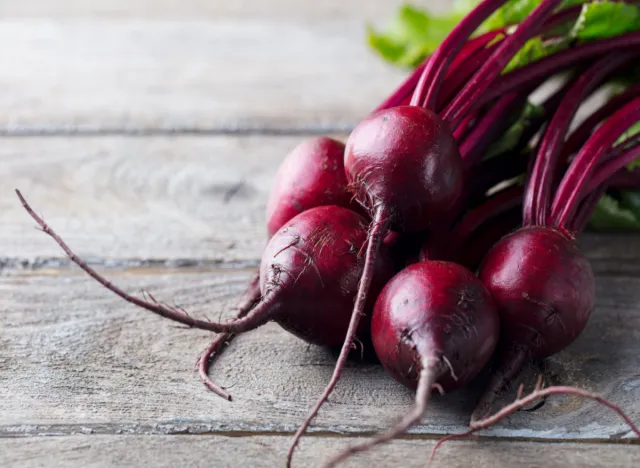
Beets provide potassium, folate, fiber, antioxidants, nitrate, betalains, and betacyanins, compounds that give beets their deep red color. Beets also contain nitrates that help relax and dilate your blood vessels, to lower your blood pressure. Preliminary research shows that beets help increase athletic performance through cardiovascular improvements. According to research published in the journal Nutrients, beetroot reduces oxidative stress and inflammation. The betalain pigments in beets provide antioxidant, anti-inflammatory, and anti-cancer properties.
Broccoli
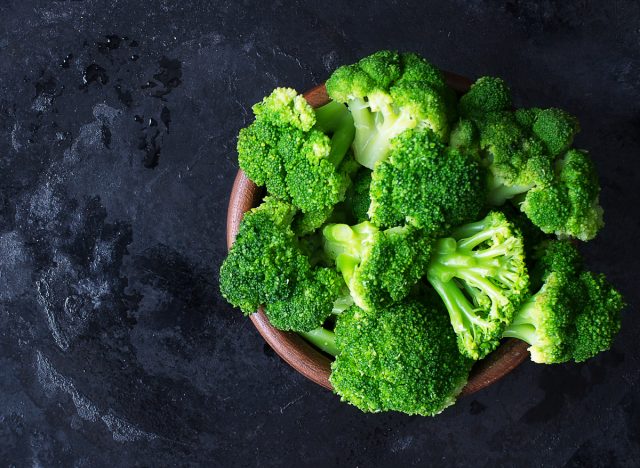
Broccoli is a popular cruciferous veggie known for its impressive health benefits. Broccoli is rich in fiber, vitamins A, C, and K, beta-carotene, calcium, potassium, and iron and it’s packed with antioxidants. Like other cruciferous vegetables, broccoli provides glucosinolates, sulforaphane, and indole-3-carbinol, all of which have been shown to have significant health-promoting effects. Broccoli provides heart-health benefits, supports eye health, boosts the immune system, promotes wound healing, and has anti-cancer properties, according to a study published in the Antibiotics.
- Source: Kalt, W., Cassidy, A., Howard, L. R., Krikorian, R., Stull, A. J., Tremblay, F., & Zamora-Ros, R. (2020). Recent Research on the Health Benefits of Blueberries and Their Anthocyanins. Advances in nutrition (Bethesda, Md.), 11(2), 224–236. https://doi.org/10.1093/advances/nmz065
- Source: Vázquez-Fresno, R., Rosana, A. R. R., Sajed, T., Onookome-Okome, T., Wishart, N. A., & Wishart, D. S. (2019). Herbs and Spices- Biomarkers of Intake Based on Human Intervention Studies - A Systematic Review. Genes & nutrition, 14, 18. https://doi.org/10.1186/s12263-019-0636-8
- Source: Thomas, D. E., & Elliott, E. J. (2010). The use of low-glycaemic index diets in diabetes control. The British journal of nutrition, 104(6), 797–802. https://doi.org/10.1017/S0007114510001534
- Source: Higgins J. A. (2012). Whole grains, legumes, and the subsequent meal effect: implications for blood glucose control and the role of fermentation. Journal of nutrition and metabolism, 2012, 829238. https://doi.org/10.1155/2012/829238
- Source: Martin, M. Á., & Ramos, S. (2021). Impact of cocoa flavanols on human health. Food and chemical toxicology : an international journal published for the British Industrial Biological Research Association, 151, 112121. https://doi.org/10.1016/j.fct.2021.112121
- Source: Cassidy, A., Mukamal, K. J., Liu, L., Franz, M., Eliassen, A. H., & Rimm, E. B. (2013). High anthocyanin intake is associated with a reduced risk of myocardial infarction in young and middle-aged women. Circulation, 127(2), 188–196. https://doi.org/10.1161/CIRCULATIONAHA.112.122408
- Source: Myers, M., & Ruxton, C. H. S. (2023). Eggs: Healthy or Risky? A Review of Evidence from High Quality Studies on Hen's Eggs. Nutrients, 15(12), 2657. https://doi.org/10.3390/nu15122657
- Source: Tremblay, A., Doyon, C., & Sanchez, M. (2015). Impact of yogurt on appetite control, energy balance, and body composition. Nutrition reviews, 73 Suppl 1, 23–27. https://doi.org/10.1093/nutrit/nuv015
- Source: Wang, H., Troy, L. M., Rogers, G. T., Fox, C. S., McKeown, N. M., Meigs, J. B., & Jacques, P. F. (2014). Longitudinal association between dairy consumption and changes of body weight and waist circumference: the Framingham Heart Study. International journal of obesity (2005), 38(2), 299–305. https://doi.org/10.1038/ijo.2013.78
- Source: Tonstad, S., Malik, N., & Haddad, E. (2014). A high-fibre bean-rich diet versus a low-carbohydrate diet for obesity. Journal of human nutrition and dietetics : the official journal of the British Dietetic Association, 27 Suppl 2, 109–116. https://doi.org/10.1111/jhn.12118
- Source: Sangaramoorthy, M., Koo, J., & John, E. M. (2018). Intake of bean fiber, beans, and grains and reduced risk of hormone receptor-negative breast cancer: the San Francisco Bay Area Breast Cancer Study. Cancer medicine, 7(5), 2131–2144. https://doi.org/10.1002/cam4.1423
- Source: Gorzynik-Debicka, M., Przychodzen, P., Cappello, F., Kuban-Jankowska, A., Marino Gammazza, A., Knap, N., Wozniak, M., & Gorska-Ponikowska, M. (2018). Potential Health Benefits of Olive Oil and Plant Polyphenols. International journal of molecular sciences, 19(3), 686. https://doi.org/10.3390/ijms19030686
- Source: Burton-Freeman, B. M., Sandhu, A. K., & Edirisinghe, I. (2016). Red Raspberries and Their Bioactive Polyphenols: Cardiometabolic and Neuronal Health Links. Advances in nutrition (Bethesda, Md.), 7(1), 44–65. https://doi.org/10.3945/an.115.009639
- Source: Chen, J., Jayachandran, M., Bai, W., & Xu, B. (2022). A critical review on the health benefits of fish consumption and its bioactive constituents. Food chemistry, 369, 130874. https://doi.org/10.1016/j.foodchem.2021.130874
- Source: Azarenko, O., Jordan, M. A., & Wilson, L. (2014). Erucin, the major isothiocyanate in arugula (Eruca sativa), inhibits proliferation of MCF7 tumor cells by suppressing microtubule dynamics. PloS one, 9(6), e100599. https://doi.org/10.1371/journal.pone.0100599
- Source: Przybylska, S., & Tokarczyk, G. (2022). Lycopene in the Prevention of Cardiovascular Diseases. International journal of molecular sciences, 23(4), 1957. https://doi.org/10.3390/ijms23041957
- Source: Miles, E. A., & Calder, P. C. (2021). Effects of Citrus Fruit Juices and Their Bioactive Components on Inflammation and Immunity: A Narrative Review. Frontiers in immunology, 12, 712608. https://doi.org/10.3389/fimmu.2021.712608
- Source: Yi, M., Wu, X., Zhuang, W., Xia, L., Chen, Y., Zhao, R., Wan, Q., Du, L., & Zhou, Y. (2019). Tea Consumption and Health Outcomes: Umbrella Review of Meta-Analyses of Observational Studies in Humans. Molecular nutrition & food research, 63(16), e1900389. https://doi.org/10.1002/mnfr.201900389
- Source: Mitra, S., Emran, T. B., Chandran, D., Zidan, B. M. R. M., Das, R., Mamada, S. S., Masyita, A., Salampe, M., Nainu, F., Khandaker, M. U., Idris, A. M., & Simal-Gandara, J. (2022). Cruciferous vegetables as a treasure of functional foods bioactive compounds: Targeting p53 family in gastrointestinal tract and associated cancers. Frontiers in nutrition, 9, 951935. https://doi.org/10.3389/fnut.2022.951935
- Source: Kapusta-Duch, J., Kopeć, A., Piatkowska, E., Borczak, B., & Leszczyńska, T. (2012). The beneficial effects of Brassica vegetables on human health. Roczniki Panstwowego Zakladu Higieny, 63(4), 389–395.
- Source: Satheesh, N., & Fanta, S. W. (2020). Kale: Review on nutritional composition, bio-active compounds, anti-nutritional factors, health beneficial properties and value-added products. Cogent Food & Agriculture, 6(1), 1811048. https://doi.org/10.1080/23311932.2020.1811048
- Source: Paudel, D., Dhungana, B., Caffe, M., & Krishnan, P. (2021). A Review of Health-Beneficial Properties of Oats. Foods (Basel, Switzerland), 10(11), 2591. https://doi.org/10.3390/foods10112591
- Source: Kris-Etherton, P. M., Hu, F. B., Ros, E., & Sabaté, J. (2008). The role of tree nuts and peanuts in the prevention of coronary heart disease: multiple potential mechanisms. The Journal of nutrition, 138(9), 1746S–1751S. https://doi.org/10.1093/jn/138.9.1746S
- Source: Marcinek, K., & Krejpcio, Z. (2017). Chia seeds (Salvia hispanica): health promoting properties and therapeutic applications – a review. Roczniki Panstwowego Zakladu Higieny, 68(2), 123–129.
- Source: Kris-Etherton P. M. (2014). Walnuts decrease risk of cardiovascular disease: a summary of efficacy and biologic mechanisms. The Journal of nutrition, 144(4 Suppl), 547S–554S. https://doi.org/10.3945/jn.113.182907
- Source: Chauhan, A., & Chauhan, V. (2020). Beneficial Effects of Walnuts on Cognition and Brain Health. Nutrients, 12(2), 550. https://doi.org/10.3390/nu12020550
- Source: Clifford, T., Howatson, G., West, D. J., & Stevenson, E. J. (2015). The potential benefits of red beetroot supplementation in health and disease. Nutrients, 7(4), 2801–2822. https://doi.org/10.3390/nu7042801
- Source: Syed, R. U., Moni, S. S., Break, M. K. B., Khojali, W. M. A., Jafar, M., Alshammari, M. D., Abdelsalam, K., Taymour, S., Alreshidi, K. S. M., Elhassan Taha, M. M., & Mohan, S. (2023). Broccoli: A Multi-Faceted Vegetable for Health: An In-Depth Review of Its Nutritional Attributes, Antimicrobial Abilities, and Anti-inflammatory Properties. Antibiotics (Basel, Switzerland), 12(7), 1157. https://doi.org/10.3390/antibiotics12071157









